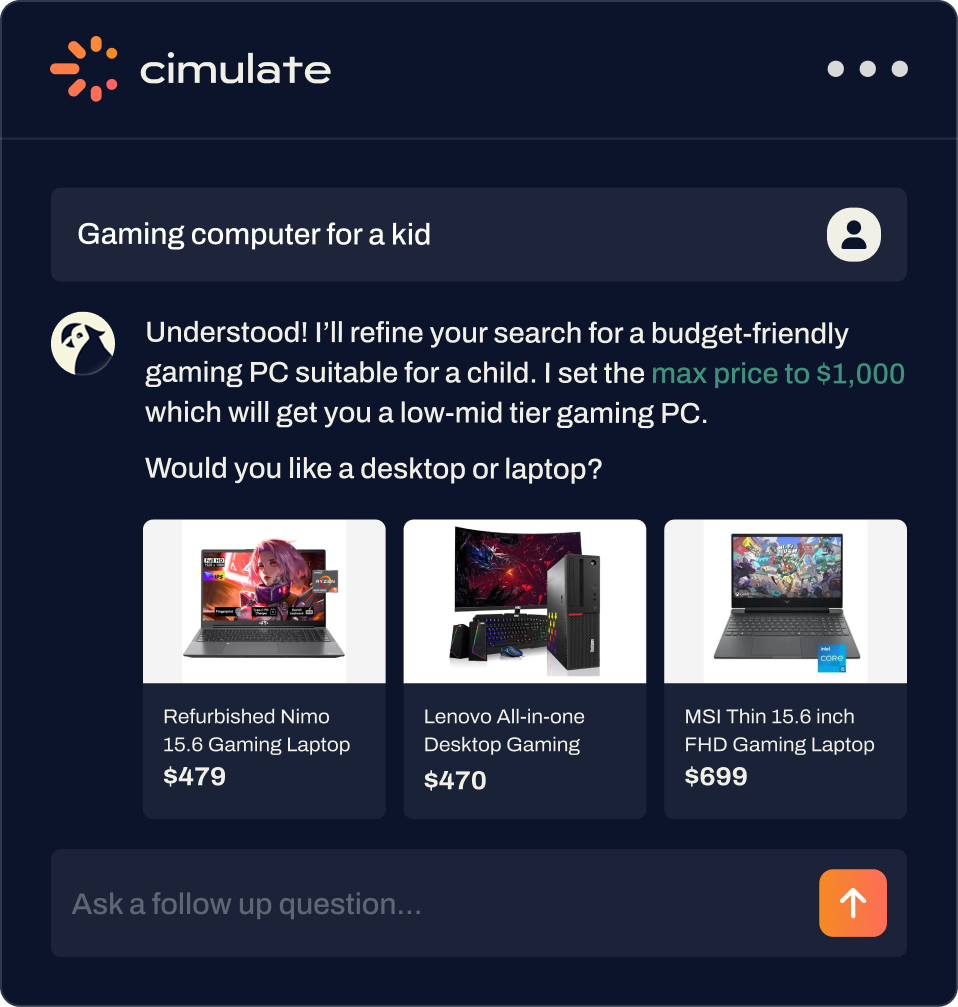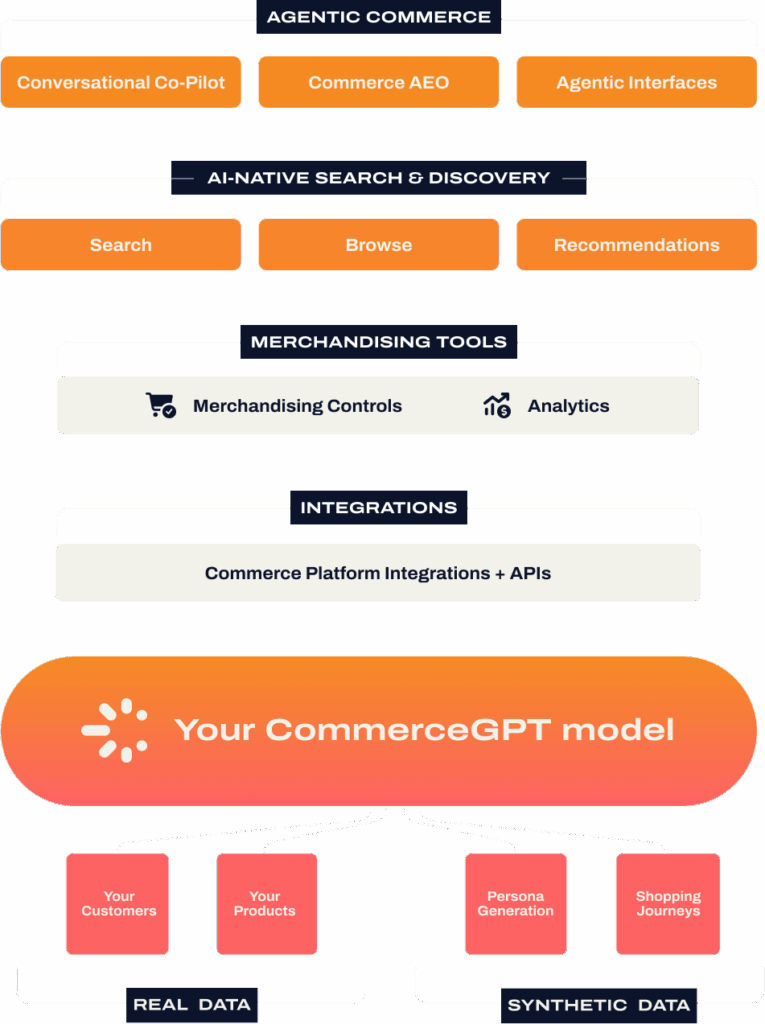What is Agentic Commerce?
November 10, 2025

In today’s digital marketplace, customers expect more than simple keyword searches they want seamless, smart interactions that feel as intuitive as talking to a friend. Agentic commerce flips the script: AI-powered assistants don’t just respond to queries, they spark discovery, steer decisions, and even finish the purchase. For retailers and brands, it means evolving from product catalogs to dynamic shopping experiences that anticipate needs, adapt in real time, and drive conversion. Learn more about agentic commerce and how it is transforming the customer experience.
What is Agentic Commerce?
Agentic commerce is the use of AI agents, hosted by AI engines (like ChatGPT or Perplexity), to deliver detailed product recommendations based on complex, intent-driven searches. These agents can discover products, negotiate, decide the best option, and even make purchases for shoppers, taking on much of the heavy lifting of shopping
The way shoppers discover and purchase products is rapidly changing. More people are turning to AI engines for recommendations because traditional ecommerce search can’t keep up with longer, conversational queries. According to Digital Commerce 360, traffic from generative AI tools to U.S. retail sites has grown 3,300% year over year.
Natural language searches are replacing keyword searches. Shoppers want to be able to search with context and intent and to have an engine truly understand what they are trying to say.
A shopper can ask ChatGPT, “Gaming computer for a kid”. ChatGPT will then respond with tailored recommendations that meet the shoppers needs, instead of the shopper having to go to a retailer’s website and filter by price and features, which still might not provide the most accurate product recommendations.

What Are the Benefits of Agentic Commerce?
Nothing is more frustrating than when shoppers cannot find the products they want on your ecommerce site because traditional search engines don’t understand their intentions. AI agents for ecommerce solve this frustration. A recent Gartner report stated that 20% of digital commerce sales will be conducted through GenAI platforms by 2030.
The retailers that are going to win in this AI explosion are the ones that make the products on their website discoverable to AI engines, like ChatGPT and Perplexity. Organizations need to learn to speak to the agents, in addition to shoppers, in order to stay ahead of the curve.
Benefits of agentic commerce:
- Drives conversions: By understanding context and reducing friction, agents can shorten the path to purchase
- Outperforms traditional personalization: AI-powered shopping focuses on the current needs of the shopper, not just their past purchases
- Future-proofs your business: As AI engines continue to gain popularity, retailers that invest in optimizing for both AI agents and their customers will come out on top
How Does Agentic Commerce Work?
AI engines are built on large language models (LLMs), which are trained on massive amounts of data. This enables these engines to understand natural language, engage in conversations, and then connect these responses to real data.
By being able to reason, AI agents can give results that make sense to shoppers and personalize further, in real time.
What is the Future of Agentic Commerce?
Agentic commerce is still in its early stages, but its trajectory is clear: shoppers will increasingly rely on AI agents to discover, compare, and even purchase products on their behalf. This shift will redefine how retailers connect with customers.
In the near future, agents won’t just assist with recommendations. They’ll act autonomously, negotiating prices, managing logistics, and optimizing decisions around convenience, sustainability, and cost. As conversational AI becomes more advanced, product discovery will evolve from keyword searches to natural, intent-driven interactions between consumer and brand agents.
For retailers, the opportunity lies in becoming agent-ready:
- Ensuring clean product data
- Real-time inventory
- Open APIs so agents can find and transact with their catalogs
Those who adapt early will gain visibility in agent ecosystems, while others risk being left out of these new digital storefronts.
4 Steps to Get Started With Agentic Commerce
To appear in these AI engines, retailers must make their products visible and understandable to AI agents. Retailers need to learn to speak with these agents. Businesses can start by:
- Improving site experience and product data so that it is discoverable by AI agents
- Upgrading their core site search to understand natural language
- Integrating AI shopping assistants to guide customers with personalized shopping journeys
- Enhancing product recommendations with context aware intelligence
What is Cimulate’s CommerceGPT?
This is where Cimulate comes in. Cimulate built the first CommerceGPT, an LLM-based operating system purpose built to understand shopper intent and drive conversions. CommerceGPT models customer intent in real-time, to power:
- Smarter search and browse
- Conversational co-pilots
- Enhanced recommendations that drive conversions
A key challenge in agentic commerce is data. AI agents need massive amounts of data to provide the most accurate search results. Cimulate solves this by using distillation via simulation:
- We create personas that simulate millions of shopper journeys.
- We turn that into synthetic data that understands intent and context.
- We combine this data with your customer data, your products, and general purpose LLMs
The result? No more data disadvantage, closing the data gap between you and retail giants like Amazon.

Want to learn more about AI’s role in the shopping journey?
Check out our report with Future Commerce, “The Concierge Economy: Understanding AI’s True Role in the Shopping Experience.”